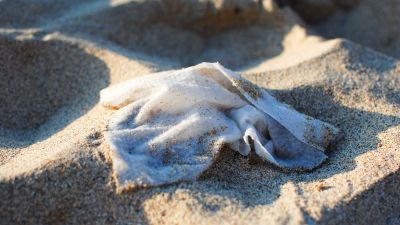Explainer
Wet wipes: What makes them so bad for the environment and why are there calls for a ban?

By ITV News Multimedia Producer Will Tullis
Eleven billion wet wipes are disposed of each year in the UK and since the start of the Covid-19 pandemic their use has accelerated to new heights.
The vast majority of them contain plastic and the scale of the problem caused by flushing them “is so big, so damaging and increasing so fast”, MPs have heard.
Labour MP Fleur Anderson’s Plastics (Wet Wipes) Bill to prohibit the manufacture and sale of wet wipes containing plastic had its first reading in the Commons on Tuesday.
MPs also heard that marine animals are dying, “wet wipe islands” are appearing, and rivers are changing shape because of flushed wipes, while Britons might be eating a “credit card’s worth of plastic” due to microplastic shards from the discarded hygiene products.
Watch Sam Holder's video report on the damage caused by wet wipes
Earlier this year a reef made up of millions of discarded wet wipes formed in the River Thames.
As the COP26 climate conference goes into its third day in Glasgow, world leaders are coming under increasing pressure to clamp down on single-use cleaning products.
But what exactly makes wet wipes so bad and if no ban is brought in, what can we do to lessen their impact on the environment?
What are wet wipes?
Wet wipes are generally defined as single-use cleaning tissues or towels which are moistened. 90% of wet wipes sold are made from artificial materials, such as polyester.
They were invented in the US in 1958, and billions of wet wipes are used around the world everyday.
During the coronavirus pandemic their use increased dramatically, with antibacterial wet wipes frequently used to clean surfaces and hands.
New parents are some of the most enthusiastic buyers of wet wipes, with many brands offering baby care wet wipe products.
Eleven billion wet wipes are used each year in the UK, with Britons spending over £500 million on the products. The industry has grown 30% since 2014.
Why are they bad, according to some?
Some wet wipes are biodegradable and environmentally friendly. However, the overwhelming majority of wet wipes are manufactured with plastic or other materials that are bad for the environment.
Some 90% of the 11 billion wet wipes used in the UK every year contain plastics that turn into microplastics when broken down.
These microplastics can contaminate water and food supplies. They can be ingested by fish and cause damage to ecosystems.
75% of flounder - a type of fish - in the Thames had plastics in their stomachs, a Water UK study said. Water UK said these plastics came largely from wet wipes.
Wet wipes also cause 93% of blockages in UK sewers.
Thames21, an environmental group that campaigns for cleaner rivers, told ITV News that once wet wipes are flushed down toilets, they build up in layers and mounds.
The group wants a total ban on all wet wipes that contain plastic. But until then, Thames21 is urging consumers to throw wet wipes in the bin, rather than flush them.Debbie Leach, CEO of Thames 21 said: "It’s a huge issue that is causing massive issues for the river... there is potentially a health issue there [too]".
What is the 'wet wipe reef'?
Five wet wipes "reefs" - made up of millions of discarded wet wipes - have formed in the River Thames. Earlier this year, ITV News visited a reef in Barnes, southwest London.
Thames21 told ITV News that rivers across the country are being turned into "plastic wastelands".
In September, the group picked up 27,000 wet wipes from a 200m stretch of the River Thames. The campaigners say that microplastics are difficult to remove via river clean-ups.
Who is calling for a ban, and why?
Labour MP Fleur Anderson is calling for a ban on the manufacture and sale of wet wipes that contain plastic. The Bill has had its first reading in Parliament today.
The MP, who is based in south London, outlined the importance of the Bill as world leaders meet at the COP26 climate conference.
She said: "As a mother of four children, I completely understand the pressures that parents are under and the difficulties that can bring when trying to cut down on plastic and make the right choices for the environment". She added: "I know that parents want to do the right things and all I am saying is that we can make it easier on them and on everyone who relies on the use of wet wipes every day."
The MP also called on wet wipe users to bin, rather than flush, the products.